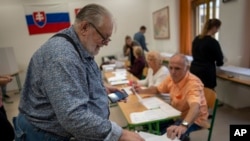Voters in Slovakia cast ballots Saturday in early parliamentary elections, and two exit polls pointed to a tight finish between a liberal, pro-West newcomer and a populist former prime minister who campaigned on a pro-Russia and anti-American message.
The polls by the Focus and Median SK agencies gave a slight edge to the Progressive Slovakia party, saying it could capture between 20% and 23.5% of the vote. Former Prime Minister Robert Fico and his leftist Smer, or Direction, party appeared headed to getting between 19% and 22%, the polls indicated.
Official results were not expected until Sunday.
The election was a test for the small eastern European country's support for neighboring Ukraine in its war with Russia, and a win by Fico could strain a fragile unity in the European Union and NATO.
Fico, 59, vowed to withdraw Slovakia's military support for Ukraine in Russia's war if his attempt to return to power succeeded.
Michal Simecka, a 39-year-old member of the European Parliament who leads the liberal Progressive Slovakia, campaigned promising to continue Slovakia's support for Ukraine.
But no party was expected to win a majority of seats, meaning a coalition government would need to be formed.
The exit polls pointed to a third-place finish with 11%-12% for the left-wing Hlas (Voice) party, led by Fico's former deputy in Smer, Peter Pellegrini. Pellegrini and Fico parted ways after Smer lost the previous election in 2020, but their possible reunion would boost Fico's chances to form a government.
Fico, who served as prime minister from 2006 to 2010 and again from 2012 to 2018, opposes EU sanctions on Russia, questions whether Ukraine can force out the invading Russian troops and wants to block Ukraine from joining NATO.
He proposes that instead of sending arms to Kyiv, the EU and the U.S. should use their influence to force Russia and Ukraine to strike a compromise peace deal. He has repeated Russian President Vladimir Putin's unsupported claim that the Ukrainian government runs a Nazi state.
Fico also campaigned against immigration and LGBTQ+ rights and threatened to dismiss investigators from the National Criminal Agency and the special prosecutor who deal with corruption and other serious crimes.
Progressive Slovakia, which was formed in 2017, sees the country's future as firmly tied to its existing membership in the EU and NATO.
The party also favors LGBTQ+ rights, a rarity among the major parties in a country that is a stronghold of conservative Roman Catholicism.
"Every single vote matters," Simecka said Saturday.
Popular among young people, the party won the 2019 European Parliament election in Slovakia in coalition with the Together party, gaining more than 20% of the vote. But it narrowly failed to win seats in the national parliament in 2020.
The exit polls indicated that seven or eight political groups and parties might surpass the 5% threshold needed for representation in the 150-seat National Council.
"It's important for me that the new coalition would be formed by such parties that can agree on the priorities for Slovakia and ensure stability and calm," Pellegrini said after voting in Bratislava.
The others include the Republic, a far-right group led by former members of the openly neo-Nazi People's Party Our Slovakia whose members use Nazi salutes and want Slovakia out of the EU and NATO.




